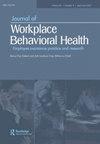Exploring protective psychological factors of healthcare professionals during COVID-19 in Singapore: A qualitative study
IF 0.8
Q3 PUBLIC, ENVIRONMENTAL & OCCUPATIONAL HEALTH
引用次数: 0
Abstract
Abstract This qualitative study aimed to explore the psychological impact of the Coronavirus 2019 (COVID-19) pandemic on frontline healthcare professionals (HCPs) both in primary care and hospital emergency departments in Singapore, to understand (1) the experience of HCPs during the outbreak, the new challenges faced on the job, how they were affected psycho-socially, (2) the support received, and (3) the protective factors of psychological distress. Purposive sampling was used to identify frontline HCPs, and those in managerial positions leading clinical teams. Semi-structured in-depth interviews were conducted with 39 participants from June to November 2020 via a video-conferencing platform, audio-recorded and transcribed verbatim. Thematic analysis using an inductive approach was conducted to elicit themes. We identified themes related to (i) the psychological impact they experienced, and (ii) the protective factors during this challenging period. In terms of psychological impact, work-related stressors such as physical burnout, loss of control and fear of infecting family were common themes. HCPs also experienced increased stress at home due to distancing measures they adhered to in order to protect their family. Themes related to psychological protective factors were also identified, such as resilience, team spirit, social support from peers, family and the public, and psychological readiness for the pandemic.探讨新加坡医疗专业人员在COVID-19期间的保护性心理因素:一项定性研究
本文章由计算机程序翻译,如有差异,请以英文原文为准。
求助全文
约1分钟内获得全文
求助全文
来源期刊

Journal of Workplace Behavioral Health
PUBLIC, ENVIRONMENTAL & OCCUPATIONAL HEALTH-
CiteScore
2.40
自引率
6.70%
发文量
14
期刊介绍:
The Journal of Workplace Behavioral Health, retitled from Employee Assistance Quarterly to better reflect its expanded focus, presents innovative research, applied theory, and practical information to keep workplace human service administrators, counselors, and consultants up to date on the latest developments in the field. This refereed journal is an essential guide to best practice and research issues faced by EAP professionals who deal with work-related and personal issues including workplace and family wellness, employee benefits, and organizational development.
 求助内容:
求助内容: 应助结果提醒方式:
应助结果提醒方式:


